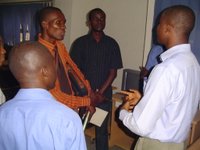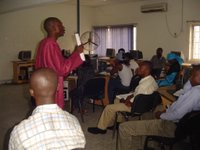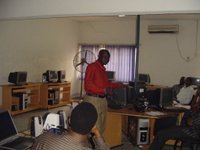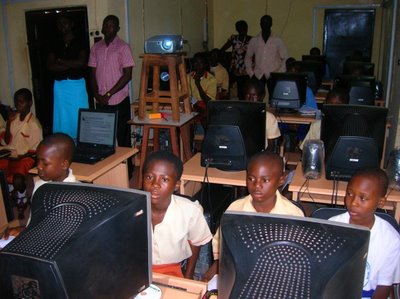During the time I was off blogging, I took part in many meetings and events that are worth blogging. I had been toying with the idea of blogging about some of them so I can have them in my archive. While thinking, two of such events came to my mind. ‘Why these ones,’ I asked myself. The answer I came up with is that the two events represent a move that will eventually require the participation of other youths to carry the initiative further. The participants at each of the meetings could be considered as privileged to be part of the process from the very beginning.
The two meetings were the Mentorship Roundtable organized by The Lagos Digital Village to mark the World Information Society Day on May 17 and the Youth Agenda 2006 held on May 27.
Here is my report of the Youth Agenda 2006. You can read about the event and get my report and that of other participants at
http://www.lagosdigitalvillage.org.ng/youthagenda.php.
Youth Agenda 2006: Nigerian Youths Mapping Out Strategies to get ICT to Rural CommunitiesMy thought since I got the invitation to the Youth Agenda 2006 had been intermittently punctured with my purpose and inputs at the event. I had schooled and stayed in every divisions of Ogun State – Abeokuta (Egba), Ilaro (Yewa), Ago-Iwoye (Ijebu), Sagamu (Remo), some of which by every standard can be defined as rural areas, and so my mental calculations were how ICT can be used to develop these areas. I had also in the course of my activities in The IET, visited some universities and polytechnics in some rural parts of the country where I easily identified with schooling in such areas. These experiences raised my expectation for the meeting.
On the day of the event, I had woken up very early in the city of Ijebu-Igbo after talking into the night with a good friend on a project we are both working on. It was really a short but fulfilling sleep because of the news I got the previous day.
I got to the park, board a Lagos bound car and sat at a very comfortable seat beside the driver. All these made the journey to be very smooth and short.
The program started late due to some reasons, which are quite understandable, and we kicked off with the video on Internet Governance. Being a lover of research, I would have been happy to win a copy of the DVD up for grabs at the end of the day. But, it went to one of the ladies from Fantsuam Foundation.
David Mutua, Project Manager of Fantsuam Foundation then came up to share the story of his work in using ICT in rural parts of the country. David is a Kenyan who came into Nigeria in 2002 through the VSO as a volunteer and was sent to the Oke-Ogun Community Development Center in Ago-Are area of Oyo State. David was there for two years till he joined Fantsuam Foundation in Kafanchan. These two places are very remote and rural. Not many Nigerian would desire working in those places but David left Kenya to work there. I salute his courage.

There was then the Speed Geek Session, which I was one of those called up impromptu to handle. We were five taken by surprise and the house was divided into five. The five of us called out were simply to tell OUR STORIES to each of the groups in four minutes succession. We were expected to share the experience of our work and organization and any new project we are on with the participants. Simply put, I delivered my shortest and purposeful speech. I got back home and wrote down what I presented during the session. This is very important to me as I used to do what I did during the session in a longer time. To do it in less than four minutes will aid my work.
Ayo Oladejo’s presentation was on how youths, NGOs and communities can take the advantage

of new technologies and FOSS (Free and Open Source Software), to improve their works. Doing this, he noted, will greatly reduce the cost of operation by removing the cost of acquiring licenses for proprietary softwares. I know about FOSS and I know Microsoft softwares, the most common and frequently cited example of proprietary softwares. I know how to use both to a large extent. However, I have carefully avoided the debate on which one is better at every occasion. My position has been to acquire the necessary competence in both so that I can rise to any occasion. For the purpose of our strategy to take ICT to rural areas, I feel everyone involved must be trained on how to deploy and maintain their operations on any of the platforms they choose. A very good way of achieving this is using the technical committee set up during the event.

‘Gbenga Sesan handled two sessions during the event. One before the much needed break and the other after. His presentation centered on using the experience of India in establishing telecenters across the country. He noted in particular that India has made all the mistakes we should avoid in Nigeria. His report from a journey to India on the “MSSRF/GKP South-South Traveling Workshop
” was also considered noting the specific examples to be copied and mistakes that could be avoided.
The house then broke into three groups according to the regions we came from. Basically, we were divided into the North, East and West on the basis of the proximity of the participants to each other. Each group was to map out the strategy of how to penetrate our regions with ICT in the next one year. My group tackled this by focusing on the work of each member of the group in this regard and how we can help to strengthen the works. Our decisions include
- Establishing a Digital Village in Ajegunle
- Strengthening the Nigerian Youth ICT for Development Network (NYIN) as a platform to seek sponsorship for our works
- Producing a Digital Village Guide to aid any organization that may want to start one
- Forming committees to produce the Guide, Implement the technical aspects of setting up the Digital Village as volunteers and map out Strategies for Sustainability
- Taking the enlightenment to secondary schools and market places
- Developing online training to build local capacities
Based on our advice, three committees were formed to handle each of the tasks during the general discussions to harmonise the strategies of each group.
Then, the event officially closed but trust us that was the beginning of the human networking sessions that continued till everyone dispersed.
The NYIN meeting started afterwards but I could not wait for it as the next day was my birthday and a party was planned. Apology if you were not aware. You can mark the date, May 28, in your calendar so that you will not miss the opportunity of sowing a gift into my life every year. Merci!!!





